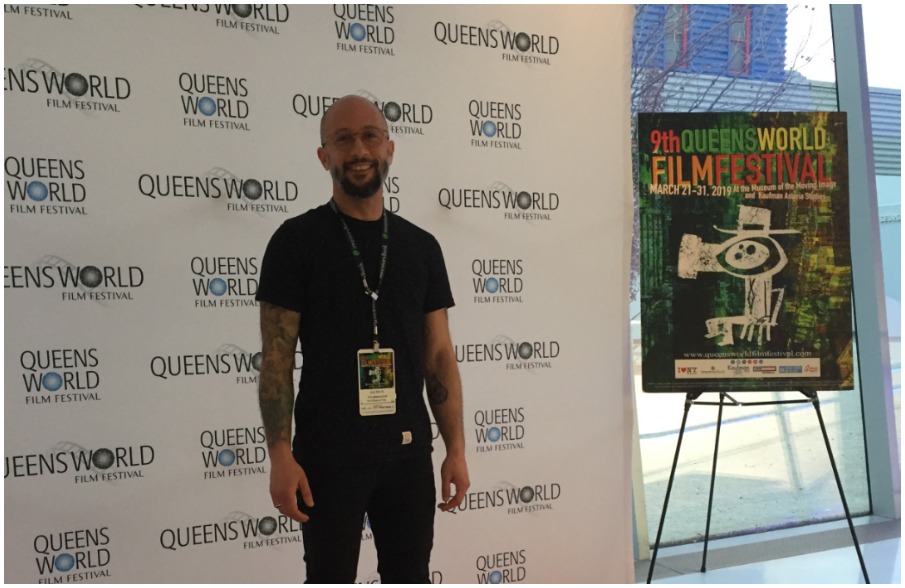“If I Had Legs I’d Kick You”, interview with director Mary Bronstein and actress Rose Byrne
"If I Had Legs I'd Kick You" interview at Rome Film Fest with Mary Bronstein and Rose Byrne: humor, tragedy, motherhood and much more
Listeners:
Top listeners:
 play_arrow
play_arrow
ENGLISH Channel 01 If English is your language, or a language you understand, THIS IS YOUR CHANNEL !
 play_arrow
play_arrow
ITALIAN Channel 02 Se l’italiano è la tua lingua, o una lingua che conosci, QUESTO È IL TUO CANALE!
 play_arrow
play_arrow
EXTRA Channel 03 FRED Film Radio channel used to broadcast press conferences, seminars, workshops, master classes, etc.
 play_arrow
play_arrow
GERMAN Channel 04 Wenn Ihre Sprache Deutsch ist, oder Sie diese Sprache verstehen, dann ist das IHR KANAL !
 play_arrow
play_arrow
POLISH Channel 05
 play_arrow
play_arrow
SPANISH Channel 06 Si tu idioma es el español, o es un idioma que conoces, ¡ESTE ES TU CANAL!
 play_arrow
play_arrow
FRENCH Channel 07 Si votre langue maternelle est le français, ou si vous le comprenez, VOICI VOTRE CHAINE !
 play_arrow
play_arrow
PORTUGUESE Channel 08
 play_arrow
play_arrow
ROMANIAN Channel 09 Dacă vorbiţi sau înţelegeţi limba română, ACESTA ESTE CANALUL DUMNEAVOASTRĂ!
 play_arrow
play_arrow
SLOVENIAN Channel 10
 play_arrow
play_arrow
ENTERTAINMENT Channel 11 FRED Film Radio Channel used to broadcast music and live shows from Film Festivals.
 play_arrow
play_arrow
BULGARIAN Channel 16 Ако българският е вашият роден език, или го разбирате, ТОВА Е ВАШИЯТ КАНАЛ !
 play_arrow
play_arrow
CROATIAN Channel 17 Ako je hrvatski tvoj jezik, ili ga jednostavno razumiješ, OVO JE TVOJ KANAL!
 play_arrow
play_arrow
LATVIAN Channel 18
 play_arrow
play_arrow
DANISH Channel 19
 play_arrow
play_arrow
HUNGARIAN Channel 20
 play_arrow
play_arrow
DUTCH Channel 21
 play_arrow
play_arrow
GREEK Channel 22
 play_arrow
play_arrow
CZECH Channel 23
 play_arrow
play_arrow
LITHUANIAN Channel 24
 play_arrow
play_arrow
SLOVAK Channel 25
 play_arrow
play_arrow
ICELANDIC Channel 26 Ef þú talar, eða skilur íslensku, er ÞETTA RÁSIN ÞÍN !
 play_arrow
play_arrow
INDUSTRY Channel 27 FRED Film Radio channel completely dedicated to industry professionals.
 play_arrow
play_arrow
EDUCATION Channel 28 FRED Film Radio channel completely dedicated to film literacy.
 play_arrow
play_arrow
SARDU Channel 29 Si su sardu est sa limba tua, custu est su canale chi ti deghet!
 play_arrow
play_arrow
“Conversation with” at the 20th Marrakech IFF, interview with actor Willem Dafoe Bénédicte Prot

PODCAST| Samantha Sartori interviews Jules Rosskam, director of the film Paternal Rites.
Jules Rosskam today received a Special Jury Prize for World Social Impact at the 9th Annual Queens World Film Festival (amazing films from around the world and around the corner). We met Jules and talked about the making of his very personal and unique documentary, what it was like working with Neely Goniodsky on the animations, and how his family reacted to it and how their perspective changed after its world premiere at MoMA film.
Paternal Rites is a first-person essay film that examines the secret underbelly of a contemporary Jewish American family as they grapple with the aftereffects of physical and sexual abuse on their present-day lives. It is also a groundbreaking film about the nature of trauma and memory itself: the ways in which trauma encrypts in uncanny ways; the function of speech and narrative in the process of decryption; and the role of film and filmmaking in the practice of healing. Paternal Rites draws inspiration from podcasts like This American Life and Radiolab and the long lineage of LGBT essay filmmakers in the U.S. such as Jenni Olson, Marlon Riggs, and Richard Fung. Functioning as the film’s primary conceit, in the fall of 2013 filmmaker Jules Rosskam and his partner, Alex, set out to retrace a road trip that Rosskam’s parents, Marilyn and Skip, completed in the fall of 1974—just prior to his birth and their transition to suburbia and parenthood. The viewer hears audio diaries that Marilyn and Skip kept during the course of their four-month journey and sees photographs and travelogue footage recorded on Super 8: barely perceptible, grainy, and quickly receding signs and landmarks carry the viewer along their route: Boston, Mobile, Savannah, Chicago, Portland, Vancouver. The visual field of Paternal Rites is dominated by bright, pristine, and nearly-still images of the American landscape, which haunt the viewer with their splendor and banality, and with the layering of still images over live-action footage. Paternal Rites also utilizes the white screen, where colorful animations and beautifully rendered, hand-painted 16mm film are used to evoke the psychoanalytic process of memory’s retrieval and trauma’s repair. Implicit throughout is the filmmaker’s queer and transgender subjectivity, which floats to the surface of the screen as the viewer is confronted with fragments of home movies of his childhood—iconic in their unremarkability—and hears audio recordings of contemporary conversations between Rosskam and Alex, who functions as Rosskam’s partner in life as well as in this project of decoding his past on screen. Together, they create a stunning visual portrait about the power of film to transform us.
To discover more about the film, click here.
Written by: fredfilmradio
Jules Rosskam Paternal Rites Samantha Sartori
Film
Paternal RitesFestival
Queens World Film FestivalNo related posts.
todayOctober 28, 2025 2
"If I Had Legs I'd Kick You" interview at Rome Film Fest with Mary Bronstein and Rose Byrne: humor, tragedy, motherhood and much more
Doclisboa International Film Festival
"Eighty Plus", by director Želimir Žilnik, is a poignant film exploring exile, social change, and family roots in Serbia, blending humor and irony to reflect a nation’s complex history.
Chloé Zhao discusses “Hamnet”, a powerful tale of love, grief, and artistic transformation, at the 20th Rome Film Fest.
Doclisboa International Film Festival
todayOctober 28, 2025 1
"Towards the Light," by director Vadim Kostrov is a poignant film exploring exile, memory, and hope through evocative imagery and personal storytelling.





© 2023 Emerald Clear Ltd - all rights reserved.